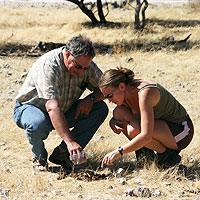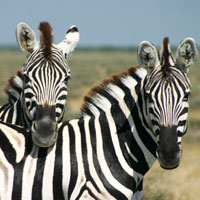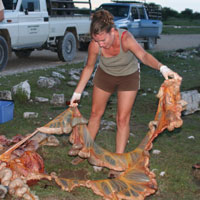

Wendy Turner
Post-doctoral Researcher
 wturner@berkeley.edu
wturner@berkeley.edu
Phone: 510-643-1227
Mailing address: 137 Mulford Hall University of California at Berkeley, Berkeley CA 94720-3114
Ph.D. Ecology, University of California, Berkeley, 2009
M.S. Zoology, University of the Witwatersrand, South Africa, 2003
B.A. Ecology and Evolutionary Biology, Cornell University, 1999
Research
I am interested in wildlife and disease ecology, with a focus on African savanna  ecosystems.
ecosystems.
My Master’s research was on the activity patterns of African buffalo in Hluhluwe-iMfolozi Park, South Africa, to understand why males exhibit alternating sexual segregation during the mating season, moving in and out of breeding herds.
My Ph.D. research is based in Etosha National Park, Namibia, studying environmentally transmitted parasites (i.e., nematodes, coccidia or Bacillus anthracis, the causative agent of anthrax) in ungulate hosts. Each of these parasites exhibits seasonality of occurrence, with gastrointestinal parasite prevalence and anthrax mortality each peaking at the end of the rainfall season. My research focuses on:
1) describing patterns of gastrointestinal parasite occurrence across an ungulate assemblage and across a rainfall gradient,
2) linking foraging behavior of ungulates with the occurrence of these environmentally-transmitted parasites, and
3) evaluating coinfections between gastrointestinal parasites and Bacillus anthracis mortality in zebra and springbok.
 I will begin post-doctoral research in 2009, continuing my research in Etosha National Park to examine the transmission link between B. anthracis and its grazing hosts. Anthrax in Etosha was historically thought to be transmitted to hosts via water, but previous studies by Pauline Lindeque and Peter Turnbull found little support for this hypothesis. The greatest concentration of anthrax spores in the environment will be found at the mortality site of an individual that died of anthrax, and these spores can remain viable for many years in the environment. I will determine if over time hosts avoid these sites, are attracted to these sites or contact these sites at random. This research will include experimental and observational studies of how nutrient pulses from ungulate carcasses into the environment affect soil fertility, grass productivity and foraging decisions by grazers. I will collaborate with Dr. Holly Ganz in our lab to determine if B. anthracis spores remain in the soil or if they associate with roots or are mechanically moved onto leaves by rainfall. I am also supervising Peace Imologhome, a Master’s student at the University of Namibia, to examine how seasonality of animal nutrition, forage selection and consumption of inorganic matter relate to anthrax occurrence for zebra and springbok.
I will begin post-doctoral research in 2009, continuing my research in Etosha National Park to examine the transmission link between B. anthracis and its grazing hosts. Anthrax in Etosha was historically thought to be transmitted to hosts via water, but previous studies by Pauline Lindeque and Peter Turnbull found little support for this hypothesis. The greatest concentration of anthrax spores in the environment will be found at the mortality site of an individual that died of anthrax, and these spores can remain viable for many years in the environment. I will determine if over time hosts avoid these sites, are attracted to these sites or contact these sites at random. This research will include experimental and observational studies of how nutrient pulses from ungulate carcasses into the environment affect soil fertility, grass productivity and foraging decisions by grazers. I will collaborate with Dr. Holly Ganz in our lab to determine if B. anthracis spores remain in the soil or if they associate with roots or are mechanically moved onto leaves by rainfall. I am also supervising Peace Imologhome, a Master’s student at the University of Namibia, to examine how seasonality of animal nutrition, forage selection and consumption of inorganic matter relate to anthrax occurrence for zebra and springbok.

